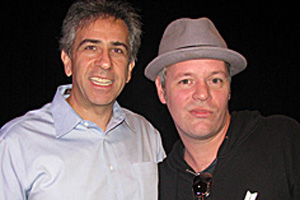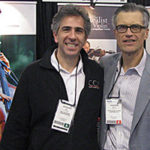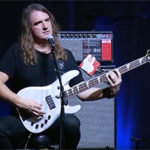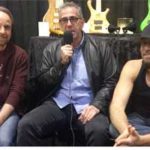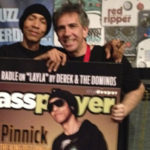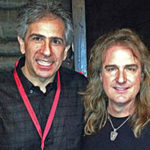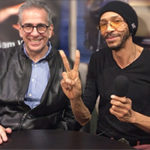Multi-faceted bottom man describes his early days in NYC, the Berklee experience and gigs with Slash, Billy Ray Cyrus and dUg Pinnick
Exclusive interview with FBPO’s Jon Liebman
February 13, 2012
Originally from New York City, David Henning attended Boston’s Berklee College of Music, after which he became a member of Atlantic Records recording group Big Wreck, a gig he held for nine years. Dave has also recorded for numerous artists on Hollywood, Def Jam, Magna Carta, Arista and Island Records, as well as various boutique labels. Henning has performed and/or toured with Slash, Billy Ray Cyrus, Ian Thornley, John Whynot, Eric Johnson, dUg Pinnick, Steve Ferrone, Myles Kennedy and countless others. He now makes his home in LA, where he works as a session bassist.
FBPO: What kind of musical upbringing did you have?
DH: I was born on the upper east side of Manhattan, but I pretty much grew up between my folks’ house in Long Island and my grandparents’ house in Queens. My dad’s office was in midtown Manhattan, so I used to go into work with him quite a bit and he would take my brother and me all over Manhattan, Brooklyn and Queens back in the ’70s and ’80s. He would always take us to musicals and plays every year. Through him, I was exposed to great writers like Gershwin, Rodgers & Hart and Ellington, while I was very young. My grandfather was the retired NYPD Chief, so he and my grandmother used to take me around the city when I was a kid. My grandfather, father and his five brothers all loved to sing. I miss those days in Queens very much. My grandfather had an incredible baritone voice and he and his six sons would all gather around the kitchen table in Queens to sing, simply for the love of it. They would sing old Irish songs and standards until the wee hours of the morning. As a child, I would usually be under the kitchen table or at the top of the stairs just to listen to them. My grandmother had quite the voice as well. So I think vocal music would ultimately be my biggest influence.
FBPO: It sounds like growing up in New York City had a profound effect on you, musically.
DH: Definitely! I was always fascinated by the musicians playing in the subways. You would hear all kinds of music while waiting for the train or standing on the street corners, much more back then than nowadays. I didn’t realize it as a kid, but later on, having seen so many diverse kinds of musicians had a definite and lasting impact on me. I also studied with some great players in New York, such as Ron Smith, who played with Elvin Jones and Gary Burton, and Chris Weigers. Both encouraged me to check out as much music as possible. Every week for about a year, when I was 19, I would take my bass to my lesson at Ron’s little apartment on Avenue A and East 7th Street in Alphabet City to learn from him. He taught me as much about life as he taught me about music. I would leave to go to his lesson an hour early just to listen to a Peruvian flute band that used to play at the 34th Street station. And Chris Weigers taught me a lot about being a solid bass player and being open minded. Chris now runs an orphanage in Kampala, Uganda, which helps kids get off the streets through music. Chris is truly an amazing person.
FBPO: It must have been great, having been exposed to so much great music growing up.
DH: I sure was! I would go to lots of shows, mainly little clubs in Long Island and Manhattan, such as CBGBs, The Bitter End, The Ritz, The Palladium, The Limelight, et cetera. No one checked IDs in New York City back in those days! I got exposed to so much music as a teenager. I fondly remember being 19 and Victor Wooten giving me and my fellow bass player friend, Eric Eggerman, a free bass lesson in the backstage room at The Bottom Line after a Flecktones show one night. Those kinds of experiences were pretty amazing and invaluable. Victor was still pretty much an unknown back then. To see someone like Victor, who is that good, be so willing to share what he knew with a couple of kids was a very valuable lesson in humility. A lot of other players I had met couldn’t be bothered, but not Victor. The rest of the Flecktones were telling Victor, “We’ve got to leave!” and Victor kept saying, “Just five more minutes. I’m giving a lesson!” Thanks, Victor!
And the same thing with dUg Pinnick. I met him after a show one night in Long Island and he was very encouraging to me. I had just watched dUg headline a sold-out show and he was just so down to earth. Seventeen years later, I returned the favor by playing bass on his solo record. It’s all about sharing what you know. There used to be a radio station in New York called KISS-FM that used to play hip-hop late at night in the early ’80s. I would stay up late with my little cassette recorder so I would have Afrika Bambaataa, Grandmaster Flash & The Furious Five and Kool Herc & the Herculoids on my tapes. Their grooves changed my life. I definitely got in a little bit of trouble for staying up so late as a kid. I was also a huge Police fan. Sting remains one of my favorite bassists to this day.
FBPO: How did you end up as a bass player?
DH: Bass wasn’t my first instrument. I sang in choir a bit when I was a kid and also played some cornet. But the teaching method applied at that school, coupled with my young age, didn’t mix well. So I was turned off from playing music until I later played drums for a while. A friend of mine down the street had a bass and I tried it and really dug the sound. That’s how I wound up with the bass.
FBPO: How would you describe your experience at Berklee College of Music?
DH: Berklee was a pretty intimidating place at first. There was so much talent there! The first semester I was there, I heard and met Matt Garrison and almost quit! I learned as much from the students as I did from the teachers. The teachers were amazing and encouraging. Professors Danny Morris and Rich Appelman had a huge influence on me there. And many of the students I met during my time there went on to become some pretty big names in the industry. In fact, I’m still keeping in touch and working with a lot of them. The other great thing about Berklee was the music library – this was pre-iTunes! I would go in there and listen to all kinds of music for hours on end.
Living in Boston in that time period was very exciting, too. There were lots of bands and clubs to check out. Berklee regularly had master players come through to conduct clinics, which was something I took great advantage of. I got to see and talk with many of the greats, some of whom are, sadly, no longer with us. Ray Brown, Max Roach, Michael Manring, Chuck Rainey, John Patitucci, Hermento Pascoal and Steve Kahn were some of the people I recall being around. Steve Kahn once spent an afternoon just hanging out with me and sharing what he knew with me about life, music and the business. To have someone be so frank and upfront about the industry really helped me get some perspective.
To this day, the Ray Brown master class remains the best I have ever attended. Ray really had a gift to pass on information in an almost sage-like Yoda kind of way, all while being really funny! And to hear his tone and time in person, versus hearing a recording, was a revelation and huge eye opener. To be able to pick a master player’s brain in person is something you just can’t put a price on. Berklee was, overall, a very positive experience.
FBPO: Tell me about Big Wreck.
DH: Big Wreck was a band originally formed at Berklee by Ian Thornley, Brian Doherty and Forrest Williams, all of whom were classmates of mine. They were writing songs and wanted an outlet for that. So we toured like crazy, recorded quite a bit and eventually landed a deal with Atlantic Records, where we stayed for five years. It was an amazing experience and an education in the music business. To meet and be involved with people like Ahmet Ertegun, who had signed some of the greatest artists of the last fifty years, was very intimidating but very cool. The whole experience was kind of like my master’s program. I got to do a lot of cool things, MTV, Rolling Stone, sold-out tours, television shows and more. Playing for 50,000 people is quite the rush! And I learned a great deal from everyone in the band and crew. I still get e-mails from all over the world from people telling me how much the band influenced them and that’s very gratifying.
FBPO: How did the Billy Ray Cyrus gig come about?
DH: The Billy Ray Cyrus connection came through an engineering friend of mine, John Nuss. He was working with Billy on a project and recommended me when Billy said he wanted to put together a band. It’s a funny story. I was halfway between Vegas and LA while heading home to LA after seeing Them Crooked Vultures play when John called me and said Billy wanted to meet me that afternoon. But I was still in the middle of the desert! So I went home, got cleaned up and headed over to Tranzformer Studios in Burbank, where we met.
We hit it off and started working together immediately. He’s a real good guy and we did some fly dates around the US and the George Lopez show. We also did a show in Texas for the soldiers being sent to Afghanistan. Hearing several thousand soldiers and their families singing the anthem was pretty humbling. Some of those guys weren’t going to be coming home. Billy’s lots of fun to work with and hang around. A very, very funny guy. If he didn’t do music, he should have gone into comedy. Also, seeing what someone that well-known has to go through in public is an eye opener. Just walking through an airport with him is quite the experience!
FBPO: How about Slash?
DH: As far as Slash, I only worked with him very briefly. I found him to be very sharp and focused as well as very down to earth, just one of the guys. There will be a record by Slash’s singer, Myles Kennedy, hopefully coming out in the next year, where I got to play on a few tracks. There’s one track with Slash and me playing together. To be on a track with someone so revered in music is very, very cool. And it’s a really cool song.
FBPO: Your resume covers such a broad spectrum of musical genres. How do you adjust your mindset, attitude, playing, et cetera, while switching gears like that. I mean, Billy Ray Cyrus and Slash have got to be two completely different kinds of vibes. Aren’t they?
DH: As far as switching genres, I look at different styles simply as music, with different vocabularies. I also know which genres are my specialties. So when I get a call for a bebop or latin gig, I have a few bass specialist friends that I’ll pass those onto. I can play in those genres enough to get by, but I will turn down a gig if I feel I’m not the right guy.
It’s not unusual for me to go from a rock & roll gig to a country gig to an R&B show within the space of a week. I really enjoy that challenge. The way I would approach a country gig is not necessarily the same as I would approach a rock gig, but the requirements are generally the same: supportive bass, not overplaying and appropriate tones are what just about everyone wants.
And speaking of tones, you need to dial in the tones for the different genres. My R&B tones are not always right for, say, a rock gig or a singer/songwriter. You need to keep those kinds of things in mind. And never forget to play for the group and the song first. Always be confident with your playing, but check your ego at the door. There’s a big difference between confidence and arrogance. I learned a lot about that from playing with people like Morris Hayes, who is Prince’s musical director. He always stresses the importance of teamwork. He also gave me one of the highest compliments I’ve ever gotten. I laid down something pretty funky at a rehearsal in Hollywood and he threw his hat at me, with a big smile!
FBPO: What else is keeping you busy these days?
DH: I was in Europe last year, touring with a rock/hip-hop band called Hyro Da Hero, playing festivals/clubs and then got back to LA and did some dates at the Baked Potato, as well as some local club dates and recording sessions. I also am part of a band called Charlie Greene & the Giant Birds. It’s the one gig I do purely for my own enjoyment. Charlie writes a lot and I get to have a lot of freedom within the context of the songs. And it has an interesting twist. Charlie’s father, Michael Greene, is in the band and was the president of NARAS (National Academy of Recording Arts & Sciences – the GRAMMYs) and I remember seeing him give a speech at Berklee in Boston about eighteen years ago. It’s amazing how small and tight the music business circles are and how many connections keep taking me back to my Berklee days.
I’m also kept busy by my 95-year-old girlfriend, a/k/a my big yellow house. I really enjoy doing renovations on my house.
FBPO: What lies ahead for you and your career? What else would you like to do that you haven’t accomplished yet?
DH: As far as the future? I would like to delve more into producing and general recording production. I am going to be building a studio later this year at my house to jump into that on a deeper level. I really enjoy helping people get their songs refined, arranged and into recorded form. I would love to help younger and new artists get going. I am always keeping an eye – and an ear – out for up and coming bands with potential. So that’s kind of where I would like the next phase of my professional life to go.
I also have a solo record planned. It’s gonna be a little different, with some pretty diverse people. I think the spectrum of musicians involved might surprise some folks!
FBPO: What would you be if you weren’t a bass player?
DH: If I wasn’t doing music, I would either be a historian, photographer or maybe some kind of craftsman. I enjoy shooting photos, building things and learning about the past. I also really used to enjoy fixing and riding motorcycles, but a bad accident in LA a few years ago cured me of that. But even with all that, music got me pretty much by the soul from a young age!
